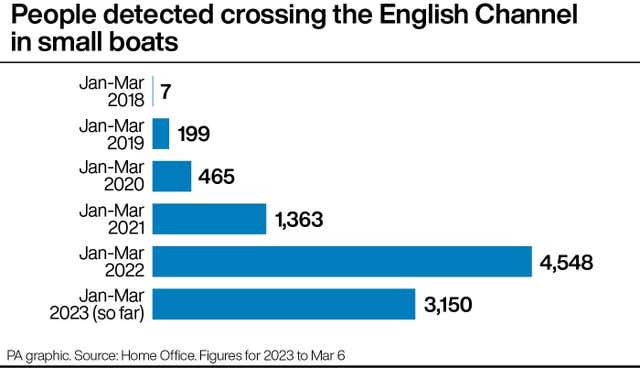Suella Braverman vows to stop migrant Channel crossings with new laws

Suella Braverman said it would “betray” British voters not to tackle the “waves of illegal migrants breaching our border” as she unveiled plans for new laws to curb Channel crossings.
The Home Secretary said legislation would be introduced which means asylum seekers will be detained and “swiftly removed” if they arrive in the UK through unauthorised means.
People crossing the Channel will not be able to claim asylum in the UK and will face a lifetime ban on returning after they are removed and they will never be allowed to settle in the country or gain citizenship.
She told MPs on Tuesday: “For a Government not to respond to waves of illegal migrants breaching our borders would be to betray the will of the people we were elected to serve.”
Speaking in the Commons, Ms Braverman added: “They will not stop coming here until the world knows that if you enter Britain illegally you will be detained and swiftly removed.
“Removed back to your country if it is safe, or to a safe third country like Rwanda. And that is precisely what this Bill will do. That is how we will stop the boats.”
Meanwhile Prime Minister Rishi Sunak is visiting Dover and will set out the plans during a press conference later.
Labour’s shadow home secretary Yvette Cooper branded the Bill a “con” and described the plans as “Groundhog Day” less than a year after reforms were brought into force under the Nationality and Borders Act.

The comments came in the wake of criticism from campaigners who said the proposed policy would be unworkable.
But Ms Braverman said the need for reform is “obvious and urgent” as the asylum system now costs the British taxpayer more than £3 billion a year and amid a record number of cases awaiting a decision.
She insisted the Government has not “sat on its hands” but added: “We’re procuring accommodation, including on military land, to end the farce of accommodating migrants in hotels.
“Let’s be honest, it’s still not enough. In the face of today’s global migration crisis, yesterday’s laws are simply not fit for purpose.”

The Bill allows the detention of illegal arrivals without bail or judicial review within the first 28 days of detention, until they can be removed, Ms Braverman said.
It also places a duty on the Home Secretary to remove illegal entrants and it will “radically narrow the number of challenges and appeals that can suspend removal”.
Only children under the age of 18, and those who are “unfit to fly or at a real risk of serious and irreversible harm – an exceedingly high bar – in the country we are removing them to will be able to delay their removal”, she said.
Any other claims will be heard “remotely” after removal.
The Bill will also introduce an annual cap, to be decided by Parliament, on the number of refugees the UK will offer sanctuary to through safe and legal routes, Ms Braverman said.
In a letter seen by the PA news agency, Ms Braverman told MPs the Government was “testing the limits” and “remain confident that this Bill is compatible with international law” but there is a “more (than) 50% chance” it may not be compatible with the European Convention on Human Rights.

Mr Sunak vowed to “stop the boats” and “grip” illegal migration as one of his five priorities for his premiership while facing pressure to tackle the issue amid dire polling figures for the Tories.
Changing the law was the most important part of the plan, he argued, as he promised it would see the UK “take back control of our borders, once and for all”.
In 2022 a record 45,755 migrants arrived in the UK after crossing the Channel.
More than 3,000 have already made the journey so far this year. Home Office figures show 197 made the crossing on Monday – the first arrivals since February 24 – taking the total to date to 3,150.

 Yahoo News
Yahoo News 
